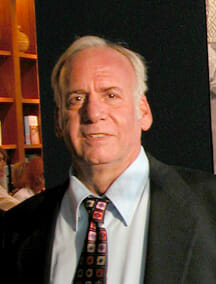At today’s meeting of the Bay Area Independent Publishers Association, Peter Beren laid out a striking picture of the events that have defined publishing this year.
Peter is a publishing consultant and agent. He was the publisher of Sierra Club Books and VIA Books, and VP of Publishing at Palace Press International. Peter is also the author and editor of numerous books with over 30 years experience in the publishing industry. You might want to visit his agenting and consulting website.A Top Ten List of a Presentation
Rather than give a formal speech or presentation to the packed roomful of authors, publishers, publishing professionals and assorted visitors, Peter simply presented the ten events that have somehow signaled the momentous changes taking place right in front of us. Here’s his list:
- Launch of the Kindle—Although the Kindle was originally released late in 2008, it only reached a wide audience in 2009. The repercussions of the move to wireless eReaders are still being felt, but there is no doubt that the landscape of the publishing industry’s distribution system has been altered.
- Napsterization of content—Peter reported that immediately after the recent launch of Dan Brown’s Title, the New York Times found eleven websites where downloads of the complete book were available for free. This type of file sharing is what brought down the music business, and could do the same to publishing.
- The iPhone—Although the iPhone screen is considered too small for an eReader, recently ebooks have become bigger sellers on the popular platform than games. Whether a new device that offers a mashup of the iPhone and an ereader like the Kindle comes along or not, the iPhone is already a force in the book market.
- The Espresso Book Machine—This self-contained, wireless, print-on-demand unit has already been ordered by numerous bookstores, with a rumored lease cost of only $1,250 per month. With a connection to over one million titles, and taking only seven minutes to produce a perfect-bound book with a color cover, this machine alone could change the industry.
- Hyrbrid Book Technology—The announcement of the Vook from Simon & Schuster, an ereader on which you can “read your book, watch videos that enhance the story and connect with authors and your friends through social media all on one screen, without switching between platforms.”
- The Google Settlement—With the decision to assign responsibility to Google for all rights management for all “orphan” books—books whose copyright holders cannot be found—Google becomes an even bigger force as it moves forward with its digitization efforts.
- The Nook—The announcement from Barnes & Noble of its own ereader, the Nook, promised delivery of bestsellers, newspapers, and magazines over 3G networks, with enough memory to store up to 17,500 works, downloadable in seconds.
- Recent Price Wars—After the move of Walmart, in its 28,000 stores, to mark down as loss leaders a selection of new bestsellers to $10 set off a price war with Amazon.com and Target, some small independents actually tried buying books from Walmart instead of their distributors, without success.
- Big Chain Pain—Besides the fact that Borders expanded aggressively into music just when the music business was about to go down the tubes, all chains are hurting with sales far below past years. Peter warned of the likely tsunami of returns if one of the big chains were to shut their doors.
- Technological Breakthroughs—Probably the oddest book event in Peter’s presentation. He described the advent of adaptive reality in the form of scannable codes printed in invisible ink inside books so that if you hold the book up to your webcam, a program on your pc is activated and animated characters appear. This might be an interview with an animated author avatar or a series of battling figures, or anything else that can be animated.
What’s the Big Picture?
The tying of a printed book into these advanced electronic interfaces does present quite a different world from the one we currently know. The onrushing tide of change in publishing, from ebooks to multimedia books to the explosion of self-publishing, to books being given away, all foretell a future that is uncertain, but which we know for sure doesn’t look like what we have today.
Takeaway: To be in the midst of systemic change isn’t always comfortable, and we won’t know for some time whose predictions are accurate. What we do know is we are on a wild ride. What do you think of Peter’s list?



